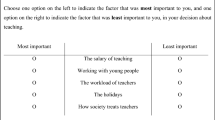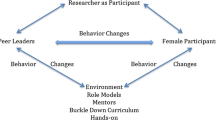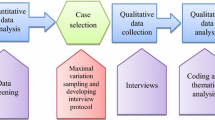Abstract
Recruitment of highly qualified science and mathematics graduates has become a widespread strategy to enhance the quality of education in the field of STEM. However, attrition rates are very high suggesting preservice education programs are not preparing them well for the career change. We analyse the experiences of professionals who are scientists and have decided to change careers to become teachers. The study followed a group of professionals who undertook a 1-year preservice teacher education course and were employed by secondary schools on graduation. We examined these teachers’ experiences through the lens of self-determination theory, which posits autonomy, confidence and relatedness are important in achieving job satisfaction. The findings indicated that the successful teachers were able to achieve a sense of autonomy and confidence and, in particular, had established strong relationships with colleagues. However, the unique challenges facing career-change professionals were often overlooked by administrators and colleagues. Opportunities to build a sense of relatedness in their new profession were often absent. The failure to establish supportive relationships was decisive in some teachers leaving the profession. The findings have implications for both preservice and professional in-service programs and the role that administrators play in supporting career-change teachers.
Similar content being viewed by others
References
Anthony, G., & Ord, K. (2008). Change-of-career secondary teachers: Motivations, expectations and intentions. Asia-Pacific Journal of Teacher Education, 36, 359–376.
Bathmaker, A.-M., & Harnett, P. (Eds.). (2010). Exploring learning, identity and power through life history and narrative research. Oxford: Routledge.
Beijaard, D. (1995). Teachers’ prior experiences and actual perceptions of professional identity. Teachers and Teaching: Theory and Practice, 1, 281–294. doi:10.1080/1354060950010209
Calderhead, J. (1981). Stimulated recall: A method for research on teaching. British Journal of Educational Psychology, 51, 211–217. doi:10.1111/j.2044-8279.1981.tb02474.x
Catena, A. N. (2009). An analysis of career choices among teachers of high academic ability. (Unpublished doctor of education thesis). University of Pennsylvania, Pennsylvania.
Charters, W. W. (1956). Survival in the profession: A criterion for selecting teacher trainees. Journal of Teacher Education, 7, 253–255. doi:10.1177/002248715600700314
Costigan, A. T. (2005). Choosing to stay, choosing to leave: New York City teaching fellows after two years. Teacher Education Quarterly, 32(2), 125–142.
Deci, E. L., & Ryan, R. M. (1991). A motivational approach to self: Integration in personality. In R. Dienstbier (Ed.), Nebraska symposium on motivation: Perspectives on motivation (Vol. 38, pp. 237–288). Lincoln: University of Nebraska Press.
Diezmann, C. M., & Watters, J. J. (2014). The knowledge base of subject matter experts in teaching: A case study of a professional scientist as a beginning teacher. International Journal of Science and Mathematics Education. doi:10.1007/s10763-014-9561-x.
Feiman-Nemser, S. (2003). What new teachers need to learn. Educational Leadership, 60(8), 25–29.
Fischer, H. (2001). Abductive reasoning as a way of worldmaking. Foundations of Science, 6, 361–383. doi:10.1023/a:1011671106610
Flores, M. A., & Day, C. (2006). Contexts which shape and reshape new teachers’ identities: A multi-perspective study. Teaching and Teacher Education, 22, 219–232. doi:10.1016/j.tate.2005.09.002
Fox, A., Deaney, R., & Wilson, E. (2010). Examining beginning teachers’ perceptions of workplace support. Journal of Workplace Learning, 22, 212–227. doi:10.1108/13665621011040671
Fox, A., & Wilson, E. (2009). ‘Support our networking and help us belong!’: Listening to beginning secondary school science teachers. Teachers and Teaching, 15, 701–718. doi:10.1080/13540600903357025
Gagné, M., & Deci, E. L. (2005). Self-determination theory and work motivation. Journal of Organizational Behavior, 26, 331–362. doi:10.1002/job.322
Goodison, I. (Ed.). (1992). Studying teachers’ lives. Oxford: Routledge.
Grier, J., & Johnston, C. (2009). An inquiry into the development of teacher identities in STEM career changers. Journal of Science Teacher Education, 20, 57–75. doi:10.1007/s10972-008-9119-2
Guarino, C. M., Santibañez, L., & Daley, G. A. (2006). Teacher recruitment and retention: A review of the recent empirical literature. Review of Educational Research, 76, 173–208.
Haggard, C., Slostad, F., & Winterton, S. (2006). Transition to the school as workplace: Challenges of second career teachers. Teaching Education, 17, 317–327. doi:10.1080/10476210601017410
Henke, R., Zahn, L., & Carroll, C. (2001). Attrition of new teachers among recent college graduates: Comparing occupational stability among 1992–1993 college graduates who taught and those who worked in other occupations. Washington, DC: National Center for Education Statistics. Retrieved from http://nces.ed.gov/pubs2001/2001189.pdf
Holdren, J. P., Lander, E. & Varmus, H. (Chairs). (2010). Prepare and Inspire: K-12 Science, Technology, Engineering, and Math (STEM) Education for America’s Future. Washington, DC: President’s Council of Advisors on Science and Technology. Retrieved from http://www.whitehouse.gov/sites/default/files/microsites/ostp/pcast-stemed-report.pdf
Holmes, T., & Cartwright, S. (1994). Mid-career change: The ingredients for success. Employee Relations, 16(7), 58–72. doi:10.1108/01425459410073997
Hong, J. Y. (2010). Pre-service and beginning teachers’ professional identity and its relation to dropping out of the profession. Teaching and Teacher Education, 26, 1530–1543. doi:10.1016/j.tate.2010.06.003
Hudson, P. (2012). How can schools support beginning teachers? A call for timely induction and mentoring for effective teaching. Australian Journal of Teacher Education, 37(7), 71–84.
Ingersoll, R. (2001). Teacher turnover and teacher shortages: An organizational analysis. American Educational Research Journal, 38(3), 499–534.
Ingersoll, R. M., & Perda, D. (2010). Is the supply of mathematics and science teachers sufficient? American Educational Research Journal, 47, 563–594. doi:10.3102/0002831210370711
Ingersoll, R. M., & Strong, M. (2011). The impact of induction and mentoring programs for beginning teachers: A Critical review of the research. Review of Educational Research, 81, 201–233. doi:10.3102/0034654311403323
Jacob, J. I., Bond, J. T., Galinsky, E., & Hill, E. J. (2008). Six critical ingredients in creating an effective workplace. The Psychologist-Manager Journal, 11, 141–161. doi:10.1080/10887150801967704
Jorissen, K. T. (2003). Successful career transitions: Lessons from urban alternate route teachers who stayed. The High School Journal, 86(3), 41–51.
Kardos, S. M., Johnson, S. M., Peske, H. G., Kauffman, D., & Liu, E. (2001). Counting on colleagues: New teachers encounter the professional cultures of their schools. Educational Administration Quarterly, 37, 250–290. doi:10.1177/00131610121969316
Lawrence, C., & Green, K. (2005). Perceiving classroom aggression: The influence of setting, intervention style and group perceptions. British Journal of Educational Psychology, 75, 587–602. doi:10.1348/000709905x25058
Leech, N. L., & Onwuegbuzie, A. J. (2007). An array of qualitative data analysis tools: A call for data analysis triangulation. School Psychology Quarterly, 22, 557–584. doi:10.1037/1045-3830.22.4.557
Luft, J. A., & Roehrig, G. H. (2007). Capturing science teachers’ epistemological beliefs: The development of the teacher beliefs interview. Electronic Journal of Science Education, 11(2), 38–63.
Maciejewski, J. (2007). Supporting new teachers: Are induction programs worth the cost? District Administration, 43(9), 48–52.
Melville, W., & Wallace, J. (2007). Subject, relationships, and identity: The role of a science department in the professional learning of a non-university science educated teacher. Research in Science Education, 37(2), 155–169. doi:10.1007/s11165-006-9020-y
Ng, J. C., & Peter, L. (2010). Should I stay or should I go? Examining the career choices of alternatively licensed teachers in urban schools. The Urban Review, 42, 123–142. doi:10.1007/s11256-009-0120-7
Nias, J. (1989). Primary teachers talking: A study of teaching as work. London: Routledge.
Organisation for Economic and Cultural Development [OECD]. (2005). Attracting, developing and retaining effective teachers—Final report: Teachers matter. Paris: OECD Publishing.
Podgursky, M., Monroe, R., & Watson, D. (2004). The academic quality of public school teachers: an analysis of entry and exit behavior. Economics of Education Review, 23, 507–518. doi:10.1016/j.econedurev.2004.01.005
Ritchie, S. M., Kidman, G., & Vaughan, T. (2007). Professional learning opportunities from uncovering cover stories of science and science teaching for a scientist-in-transition. Cultural Studies of Science Education, 2, 225–242. doi:10.1007/s11422-006-9044-7
Rubin, H. J., & Rubin, I. S. (2005). The art of hearing data (2nd ed.). Thousand Oaks, CA: Sage.
Schempp, P. G., Sparkes, A. C., & Teplin, T. J. (1998). Identity and induction: Establishing the self in the first years of teaching. In R. P. Lipka & T. M. Brinthaupt (Eds.), The role of self in teacher development (pp. 142–164). Albany, NY: State University of New York Press.
Schlechty, P. C., & Vance, V. S. (1981). Do academically able teachers leave education? The North Carolina Case. The Phi Delta Kappan, 63(2), 106–112.
Snyder, C., Oliveira, A. W., & Paska, L. M. (2013). STEM career changers’ transformation into science teachers. Journal of Science Teacher Education, 24, 617–644. doi:10.1007/s10972-012-9325-9
Soenens, B., & Vansteenkiste, M. (2011). When is identity congruent with the self? A self-determination theory perspective. In S. J. Schwartz, K. Luyckx, & V. L. Vignoles (Eds.), Handbook of identity theory and research (pp. 381–402). New York: Springer.
Stafford, D. L. (2008). First career and second career secondary novice teachers’ self-assessed value of induction and impact of mentor support to their teacher competency. (Unpublished doctor of education thesis). Azusa Pacific University, California.
Stryker, S. (1968). Identity salience and role performance: The importance of symbolic interaction theory for family research. Journal of Marriage and the Family, 30, 558–564. doi:10.2307/349494
Veenman, S. (1984). Perceived problems of beginning teachers. Review of Educational Research, 54, 143–178.
Watt, H. M., Richardson, P. W., & Pietsch, J. (2007). Choosing to teach in the “STEM” disciplines: Characteristics and motivations of science, ICT, and mathematics teachers. Paper presented at the Mathematics Education Research Group of Australasia, Hobart, TAS, Australia.
Watters, J. J. (2010). School administrators' perceptions of beginning secondary science and mathematics teachers. Paper presented at the Australasian Science Educators Research Association Annual Conference, Port Stevens, New South Wales, 30 June–4 July, 2010.
Wilson, E., & Deaney, R. (2010). Changing career and changing identity: How do teacher career changers exercise agency in identity construction? Social Psychology of Education, 13, 169–183. doi:10.1007/s11218-010-9119-x
Yin, R. K. (2009). Case study research: Design and methods (4th ed., Vol. 5). Thousand Oaks, CA: Sage.
Acknowledgments
This research was funded by the Australian Research Council DP0984349. Ethical approval was granted by the University ethics committee. We thank the participants in this study and the schools for their cooperation.
Author information
Authors and Affiliations
Corresponding author
About this article
Cite this article
Watters, J.J., Diezmann, C.M. Challenges Confronting Career-Changing Beginning Teachers: A Qualitative Study of Professional Scientists Becoming Science Teachers. J Sci Teacher Educ 26, 163–192 (2015). https://doi.org/10.1007/s10972-014-9413-0
Published:
Issue Date:
DOI: https://doi.org/10.1007/s10972-014-9413-0




